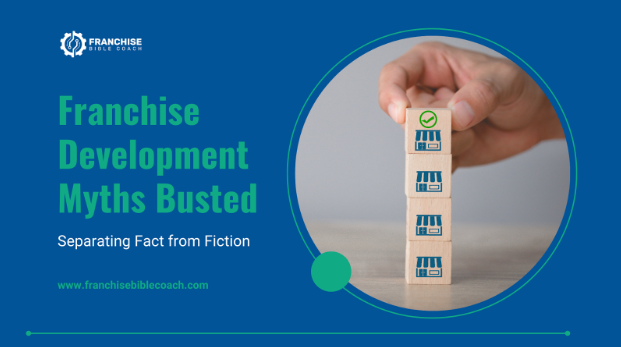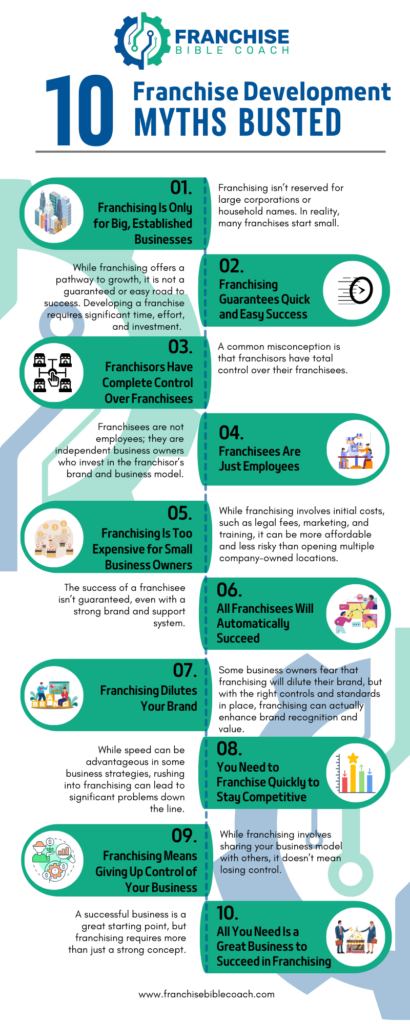
Franchise Development Myths Busted: Separating Fact from Fiction
Introduction
Franchising is an appealing pathway for entrepreneurs looking to expand their business footprint without shouldering the entire burden of growth. It offers a way to leverage the resources, dedication, and entrepreneurial spirit of others while growing your brand and market presence. However, numerous myths and misconceptions cloud the true picture of what it means to develop a franchise. These myths can deter potential franchisors or lead them down the wrong path, resulting in costly mistakes. In this blog, we’ll bust some of the most common myths about franchise development and provide you with the facts to make informed decisions. Whether you’re considering franchising as a way to grow your business or simply exploring the concept, understanding these myths is crucial for navigating the franchise landscape effectively.

Myth 1: Franchising Is Only for Big, Established Businesses
Fact: Franchising isn’t reserved for large corporations or household names. In reality, many franchises start small. What matters most is a replicable, scalable business model with a proven track record of success. Even small businesses with a unique value proposition and solid operational systems can thrive as franchises. For example, many well-known franchises, such as Subway and 7-Eleven, started as small operations before scaling through franchising. The key is not size but the ability to transfer knowledge, maintain consistency, and replicate success across multiple locations.
Why This Matters: Believing that franchising is only for large businesses may cause you to overlook a viable growth opportunity. If your business is profitable, you have standardized processes, and you are committed to supporting others, franchising could be an excellent path forward. Small businesses with a strong brand identity, customer loyalty, and streamlined operations are well-positioned to benefit from franchising. Moreover, smaller businesses often bring a personal touch and flexibility that can appeal to franchisees looking for more intimate business relationships.
Myth 2: Franchising Guarantees Quick and Easy Success
Fact: While franchising offers a pathway to growth, it is not a guaranteed or easy road to success. Developing a franchise requires significant time, effort, and investment. From creating a franchise disclosure document (FDD) to recruiting the right franchisees, providing ongoing support, and ensuring brand consistency, franchising is a complex process that demands dedication and strategic planning. Successful franchising involves marketing, training, legal compliance, and the ability to adapt to market changes. The journey to franchising success is a marathon, not a sprint.
Why This Matters: Many aspiring franchisors underestimate the effort required to build a successful franchise system. They may overlook the importance of thorough market research, the need for robust training programs, or the value of ongoing franchisee support. This misconception can lead to underinvestment in critical areas, resulting in poor franchisee performance and brand damage. Understanding the realities of franchising will help you prepare adequately and set realistic expectations for your journey. It’s essential to view franchising as a long-term strategy that requires ongoing attention and resources.
Myth 3: Franchisors Have Complete Control Over Franchisees
Fact: A common misconception is that franchisors have total control over their franchisees. In truth, franchisors set the standards, provide the framework, and support the franchisees, but franchisees operate their businesses independently within those guidelines. Franchisors must strike a delicate balance between maintaining brand consistency and allowing franchisees the autonomy to manage their operations. This autonomy is crucial because it allows franchisees to leverage their local market knowledge and entrepreneurial spirit, which can drive the success of the franchise.
Why This Matters: Misunderstanding the franchisor-franchisee relationship can lead to conflicts and operational issues. Franchisors who try to exert too much control may face resistance and dissatisfaction from franchisees, potentially leading to disputes or even legal challenges. Conversely, a lack of oversight can result in brand inconsistency and customer dissatisfaction. Clear communication, well-defined expectations, and a supportive approach are crucial for a harmonious and productive partnership. Successful franchisors recognize the importance of collaboration and provide the right balance of guidance and independence to their franchisees.
Myth 4: Franchisees Are Just Employees
Fact: Franchisees are not employees; they are independent business owners who invest in the franchisor’s brand and business model. They bear the financial risks and benefits of their operations, making their success a direct reflection of their efforts and the franchisor’s support system. Franchisees typically make a substantial investment in the business, pay ongoing royalties, and are responsible for their day-to-day operations. They are entrepreneurs who value the benefits of a proven business model but also want the autonomy to run their own business.
Why This Matters: Viewing franchisees as mere employees can harm the relationship and undermine the collaborative spirit essential for franchise success. Franchisees are partners who bring capital, energy, and local market insights to the table. Recognizing them as business partners fosters mutual respect and drives shared success. Franchisors who treat their franchisees as valued stakeholders rather than subordinates are more likely to build a loyal and motivated franchise network.
Myth 5: Franchising Is Too Expensive for Small Business Owners
Fact: While franchising involves initial costs, such as legal fees, marketing, and training, it can be more affordable and less risky than opening multiple company-owned locations. Additionally, franchising allows business owners to leverage the capital and motivation of franchisees, reducing the financial burden on the franchisor. The cost of franchising varies widely depending on the complexity of the business model, the support provided, and the industry. Many franchisors offset the costs through initial franchise fees and ongoing royalties, which provide a steady revenue stream.
Why This Matters: If you dismiss franchising as too costly, you might miss out on a scalable growth strategy that can be tailored to fit your financial situation. Working with knowledgeable advisors can help you manage costs effectively, and there are various financing options available to support franchise development. It’s important to conduct a thorough cost-benefit analysis and consider the long-term potential of franchising as an investment in your brand’s growth.
Myth 6: All Franchisees Will Automatically Succeed
Fact: The success of a franchisee isn’t guaranteed, even with a strong brand and support system. Franchisees must have the right mindset, dedication, and ability to follow the franchisor’s system. It’s also crucial for franchisors to carefully vet potential franchisees to ensure they are a good fit for the brand. The success of a franchisee depends on multiple factors, including their business acumen, market conditions, and their ability to manage their operations effectively. Franchisors need to provide robust training, support, and continuous engagement to help franchisees succeed.
Why This Matters: Realizing that not all franchisees will succeed allows franchisors to put more effort into the recruitment and training processes. It also emphasizes the importance of ongoing support and monitoring to help franchisees thrive. Franchisors should establish clear performance metrics, offer regular feedback, and create opportunities for franchisees to share best practices and learn from each other. By fostering a culture of continuous improvement and support, franchisors can enhance the overall success rate of their franchisees.
Myth 7: Franchising Dilutes Your Brand
Fact: Some business owners fear that franchising will dilute their brand, but with the right controls and standards in place, franchising can actually enhance brand recognition and value. The key is to establish comprehensive brand guidelines and ensure that all franchisees adhere to them. This includes everything from marketing materials and customer service standards to product quality and store appearance. A well-executed franchise strategy can amplify your brand presence and build a strong, unified identity across multiple locations.
Why This Matters: Concerns about brand dilution can prevent businesses from exploring franchising as a growth strategy. However, franchising offers the opportunity to expand your brand reach while maintaining control over how it is represented. By investing in brand training, conducting regular audits, and maintaining open lines of communication with franchisees, franchisors can protect and even enhance their brand reputation.
Myth 8: You Need to Franchise Quickly to Stay Competitive
Fact: While speed can be advantageous in some business strategies, rushing into franchising can lead to significant problems down the line. A successful franchise program requires careful planning, thorough market research, and a robust operational framework. Taking the time to develop a solid foundation will set the stage for sustainable growth and minimize the risks associated with rapid expansion. It’s better to focus on quality and long-term success than to rush into franchising without the necessary preparation.
Why This Matters: Rushing into franchising can result in incomplete systems, insufficient support, and unprepared franchisees, which can harm your brand and franchisees’ success. A deliberate and strategic approach to franchising allows you to refine your model, address potential challenges, and build a strong support structure that will benefit both you and your franchisees. The goal is to create a scalable model that can grow at a sustainable pace, ensuring that each new franchise location has the best chance for success.
Myth 9: Franchising Means Giving Up Control of Your Business
Fact: While franchising involves sharing your business model with others, it doesn’t mean losing control. Franchisors retain control over the brand, business systems, and standards that franchisees must follow. The key is to establish clear guidelines and provide the training and support needed to ensure compliance. Franchisors can set the rules around branding, products, services, and customer experience, allowing them to maintain control over the most critical aspects of the business.
Why This Matters: The fear of losing control can prevent business owners from pursuing franchising as a growth strategy. However, franchising provides a unique opportunity to expand your business while maintaining oversight of your brand and operations. By establishing a strong franchise agreement and maintaining open communication with your franchisees, you can protect your brand integrity and ensure that your vision is upheld across all locations.
Myth 10: All You Need Is a Great Business to Succeed in Franchising
Fact: A successful business is a great starting point, but franchising requires more than just a strong concept. It involves creating replicable processes, developing comprehensive training programs, and providing ongoing support to franchisees. Franchisors must also navigate legal requirements, manage franchise relationships, and continually innovate to stay competitive. A great business is the foundation, but franchising success requires a broader set of skills and resources.
Why This Matters: Assuming that a great business will automatically translate to franchising success can lead to underestimating the challenges involved. Franchisors need to invest in the right resources, including experienced consultants, legal advisors, and franchise management tools, to build a successful franchise system. A holistic approach encompassing all franchise development aspects will set the stage for sustainable growth and success.
Conclusion
Franchising is a powerful tool for business growth, but it’s essential to approach it with a clear understanding of the realities involved. By debunking these common myths, you can make more informed decisions and better prepare for the challenges and opportunities of franchising. Remember, franchising is not a one-size-fits-all solution, and success depends on careful planning, commitment, and ongoing support.
Ready to explore franchising for your business? Fill out the “Franchise Your Business Assessment” for more in-depth insights and to get started on the right foot.


